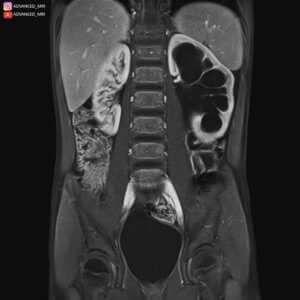An MRI of the kidney is a safe and painless procedure that uses radio waves and magnets to obtain 3D images of your kidneys. It can also provide a functional assessment of your kidneys, including information about their GFR, blood volume and perfusion, diffusion, and oxygenation. Your healthcare team will use these images to detect possible issues with your kidney health. MRI scans of your kidneys can help see conditions like kidney cancer, chronic kidney disease, renal vein thrombosis, and the presence of tumors, masses, stones, or infection.
An MRI of the kidney can also help assess or visualize the following:
*Obstruction of urine flow, which can lead to acute renal failure
*Size of your kidneys, including the thickness of the cortex area where blood is filtered
*The presence of cysts that may occur in polycystic kidney disease
*Presence of blood clots in the vein that drains blood from the kidneys, also known as renal vein thrombosis
*Renal hypertension, high blood pressure or narrowing of the renal arteries that carry blood to the kidney
*Glomerulonephritis or a condition in which the glomeruli (found in nephrons) of the kidney is inflamed
*Acutetubular necrosis or a condition when the renal tubules are damaged, resulting in acute kidney injury
*Scarring of renal parenchyma (the cortex and medulla) or functional tissues of the kidneys
*Renal artery stenosis or a condition where there is a narrowing of the renal artery
*Renal cell carcinoma, the most common type of kidney cancer in adults
*Renal infections, Renal stones, Renal masses or lesions
There are two types of MRI scans for your kidneys: imaging with or without contrast agents. A contrast agent is a dye or liquid injected into your body to make soft tissues visible during the imaging process.

